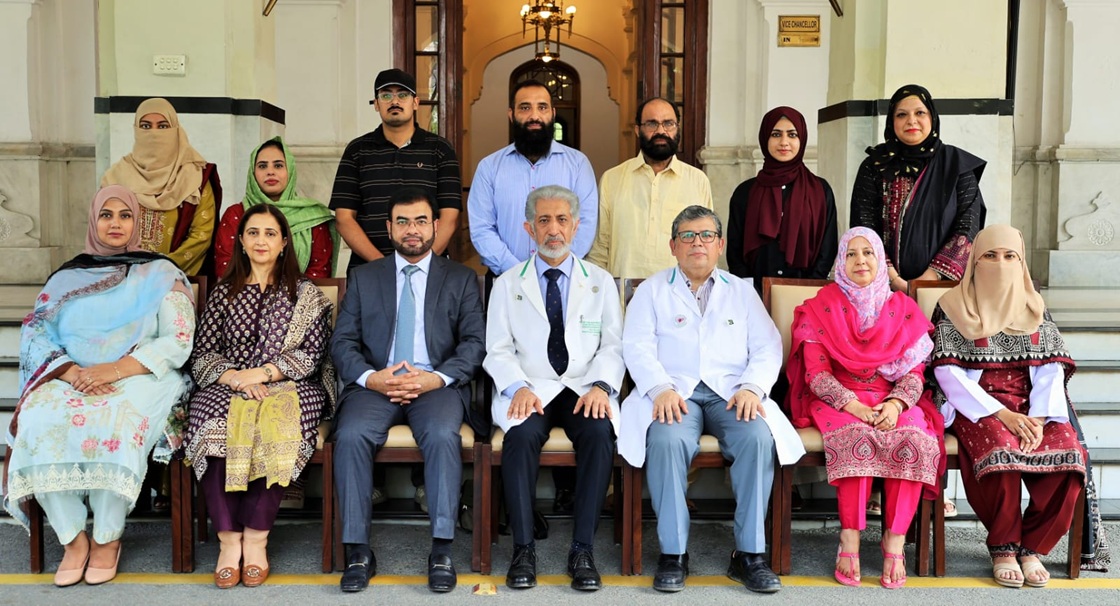Prof. Dr. Muhammad Shakil
MBBS, MCPS, M.Phil, PhD, CMT
Professor & Chairman Department of Biochemistry
Email: mshakil@kemu.edu.pk
042-99214687
INTRODUCTION OF DEPARTMENT
The Department of Biochemistry is currently chaired by Prof. Dr. Muhammad Shakil, who is a medical graduate with PhD in the subject of Biochemistry. The department was first established in King Edward Medical College, Lahore on 29th April 1980 as a separate entity and Prof. Abdus Salam was its founding head. In 1990, the University of Punjab awarded status to the subject to be separately examined in MBBS degree program thereafter. Biochemistry encompasses metabolism of biomolecules, enzymology, endocrinology and genetics. Over the last decades of the 20th century, biochemistry has become successful at explaining living processes. Almost all areas of life sciences are being uncovered and developed by biochemical methodology and research.
Undergraduate students of MBBS are being trained in the subject of Medical Biochemistry with the belief that understanding the biochemical basis of health and disease may help in the practice of clinical medicine. Students must focus not only on the accumulation of factual knowledge of the subject but also on the development of ideas & relationships that will be helpful in their clinical practice. Moreover, undergraduate & postgraduate students are being taught the molecular & biochemical basis of genetics considering the current era as the genomic era of molecular medicine.
Department of Biochemistry has been recognized for M.Phil. and Ph.D. (Biochemistry) by PM&DC & accredited for FCPS-II training in Biochemistry by CPSP. Efforts are being made to uplift the standard of teaching and research in the subject of medical Biochemistry to produce the graduates (MBBS, DPT, BSc Nursing & Allied Health Sciences) and post-graduates (M.Phil., FCPS, Ph.D.) at par with the modern era of genomic medicine.
GOALS AND OBJECTIVES
Goals:
- To enable undergraduate students to critically evaluate & interpret biochemical basis of biological processes.
- To provide postgraduate students with the ability to master the discovery & translation of new knowledge concerning the molecular basis of life through interdisciplinary research and training.
- To produce aspiring molecular life scientists who can make discoveries in the field of health to prevent, diagnose or treat diseases
Objectives:
- To make medical, & Allied health undergraduate students understand fundamental concepts of biochemistry and to enable them to apply those concepts to the practice of medicine.
- To provide teaching assistance to nursing undergraduate students in the subject of biochemistry.
- To provide an advanced understanding of the core principles of Biochemistry and their molecular basis to the postgraduate students, and to enable them to acquire a specialized knowledge and understanding of integral aspects through assignments and research project.
- To develop psychomotor skill in undergraduate students for practical work based on principles of various conventional & specialized lab investigations, instrumentation analysis.
- To introduce students to modern methods of biochemical experimentation and employing those methods to promote research at postgraduate level in the field of clinical & molecular Biochemistry.
FACULTY

| LIST OF FACULTY MEMBERS | |||
| NAME | DESIGNATION | QUALIFICATION | CONTACT INFORMATION |
| Prof. Dr. Muhammad Shakil | Professor/Chairman | MBBS, MCPS,M.Phil,PhD,CMT | mshakil@kemu.edu.pk |
| Dr.Faiza Iram | Associate Professor | MBBS,MCPS,M.Phil,HPE | faizaabrar@gmail.com |
| Dr. Amna Ihsan | Assistant Prodessor | MBBS,Mphil | dramnaihsan@gmail.com |
| Dr. Mehwish iftikhar | Assistant Professor | MBBS,M.Phil(Biochemistry) | Mehwish.sheharyar@gmail.com |
| Dr. Sehrish Lodhi | Assistant Professor | MBBS,M.Phil(genetics) M.Phil(Biochmeistry),CMT | sehrishnadyme@yahoo.com |
| Dr. Mushayyda Rathore | Assistant Professor | MBBS,MPhil | maishirathore@gmail.com |
| Dr. Ammara Niaz Awan | Demonstrator | MBBS,MPhil,CMT | ammaraniaz@kemu.edu.pk |
| Ms. Amber Nawab | Biochemist | MPhil (Biochemistry) | chaudaryamber@yahoo.com |
EDUCATIONAL ACTIVITIES
- MBBS
- Doctor of Physiotherapy
- BSc Vision & Allied Health Sciences
- BSc Nursing
- M.Phil (Biochemistry)
- FCPS (Biochemistry)
- Ph.D (Biochemistry)
RESEARCH
| RESEARCH PROJECT | STATUS |
| Ullah MI, Dad R, Rehman Z, Shakil M, Alsrhani A, Alameen AAM, Ghanem HB, Manni E, Khan MU, Atif M. Novel ATOH7 mutation and structural characterization in families with optic nerve hypoplasia. Int J Ophthalmol. Sep. 18, 2025; Vol. 18, No. 9, 1705-1712 | Published |
| Kaul H, Naz S, Ahmad H.I, Saleem N, Shakil M, Firasat S, Majeed B, Sharif S, Rashid F, Etezaz A, Khan M.U. Molecular Characterization of Oculocutaneous Albinism in Consanguineous Pakistani Families: Unraveling Disease-Causing Pathogenic Variants in OCA2 and TYR Genes for Precision Diagnosis. Biochemical Genetics. 2025 May. https://dio.org/10.1007/s10528-025-11113-3 | Published |
| Riaz A, Saghir S, Anwar R, Khalid S, Shakil M, Fatima T. The predictive validity of serum biochemical markers in case of acute biliary pancreatitis. The Professional Medical Journal. 2024 May 4;31(05):68993. | Published |
| Ullah MI, Rehman Z, Dad R, Alsrhani A, Shakil M, Ghanem HB, Alameen AA, Elsadek MF, Eltayeb LB, Ullah S, Atif M. Identification and Functional Characterization of Mutation in FYCO1 in Families with Congenital Cataract. Life. 2023 Aug 21;13(8):1788. | Published |
| Shakil M, Akbar A, Aisha NM, Hussain I, Ullah MI, Atif M, Kaul H, Amar A, Latif MZ, Qureshi MA, Mahmood S. Delineating Novel and Known Pathogenic Variants in TYR, OCA2 and HPS-1 Genes in Eight Oculocutaneous Albinism (OCA) Pakistani Families. Genes. 2022 Mar 12;13(3):503. | Published |
| Latif MZ, Hussain I, Afzal S, Naveed MA, Nizami R, Shakil M, Akhtar AM, Hussain S, Gilani SA. Impact of Refractive Errors on the Academic Performance of High School Children of Lahore. Frontiers in Public Health. 2022;10. | Published |
| Ali S, Shahid MH, Shakil M, Shahzad A, Ihsan KM, Waheed K. Effect of Facedown vs Non-Facedown Position on Macular Hole Closure after Surgery. Pak. J Med. Health Sci 2022 Aug 23;16(07):413-. | Published |
| Nabil IM, Shakil M, Zainab MB, Omar A, Muhammad IU. Impact of Varicella-Zoster Virus/Hepatitis C Virus (VZV/HCV) co-infection on liver enzymes activity. Research Journal of Biotechnology Vol. 2022 Jan;17:1. | Published |
| Shakil M, Sultana K, Iqbal RN, Ullah MI, Hussain S, Mahmood S. Serum melanin and alpha-melanocyte stimulating hormone levels in Pakistani individuals affected with oculocutaneous albinism. Rawal Medical Journal. 2022 Jan;47(1). | Published |
| Mukhtar S, Choudhry N, Saeed S, Hanif A, Gondal AJ, Yasmin N. Exploring the associations between elevated plasma SP-D levels and OSCAR gene expression as potential biomarkers in patients with COPD: a cross-sectional study. Frontiers in Pharmacology, July 18, 2024. https://doi.org/ 10.3389/fphar.2024.1376394. | Published |
| Gondal AJ, Choudhry N, Niaz A, Yasmin N. Molecular Analysis of Carbapenem and Aminoglycoside Resistance Genes in Carbapenem-Resistant Pseudomonas aeruginosa Clinical Strains: A Challenge for Tertiary Care Hospitals. Antibiotics, Feb, 2024, 13, 191. https://doi.org/10.3390/antibiotics13020191 | Published |
| Rizvi Z, Choudhry N, Gondal AJ, Yasmin N. Association of Surfactant Protein D Single Nucleotide Polymorphisms rs721917, rs2243639, rs3088308 with Recurrent Aphthous Stomatitis in Pakistani Population. Genes, May, 2023, 14, 119. https://doi.org/10.3390/genes14051119 | Published |
| Gondal AJ, Choudhry N, Bukhari H, Rizvi Z, Jahan S, Yasmin N. Estimation, Evaluation and Characterization of Carbapenem Resistance Burden from a Tertiary Care Hospital, Pakistan. Antibiotics, March, 2023, 12, 525. https://doi.org/10.3390/antibiotics12030525 | Published |
| Gondal AJ, Choudhry N, Bukhari H, Rizvi Z, Yasmin N. Characterization of Genomic Diversity among Carbapenem Resistant Escherichia coli Clinical Isolates and Antibacterial Efficacy of Silver Nanoparticles from Pakistan. Microorganisms, November2022, 10, 2283. https://doi.org/10.3390/microorganisms10112283 | Published |
| Hamid A, Ammara Niaz Awan, Nakhshab Choudhry, sehrish Nadyme, Irsa Asif, Aamir Jamal Gondal, Nighat Yasmin. Association of Insulin Like Growth Factor-1 and Sex Hormones in Patients of Acne Vulgaris. Esculapio – JSIMS [Internet]. 2025 Jan. 28 [cited 2025 Sep. 11];20(4):455-61. Available from: https://esculapio.pk/journal/index.php/journal-files/article/view/1171 | Published |
| Qureshi K, Rathore M, Noor-Ul-Ain Waheed SL, Yasmin N, Gondal AJ, Choudhry N. Estimation of Serum Thyroid Stimulating Hormone and Anti-Thyroid Antibodies as Biomarkers of Malignancy in Thyroid Nodule Patients. Pakistan Journal of Medical & Health Sciences. 2022 Dec 24;16(11):177-179 | Published |
| Rathore M, Choudhry N, Ahmed R, Qureshi K, Nadyme S, Gondal AJ, Yasmin N..Serum Interleukin-4 and Interleukin-10 Levels as Biomarkers in the Early onset Pre-eclampsia.J Soc Obstet Gynaecol Pak. 2024; 14(2):129-134. | Published |
| Ahmed R, Choudhry N, Rathore M, Qureshi K, Niaz Awan A, Gondal AJ. Effectiveness of Urinary Kidney Injury Molecule-1 to diagnose Subclinical Acute Kidney Injury induced by Extracorporeal Shock Wave Lithotripsy. Esculapio – JSIMS [Internet]. 2024 Jul. 18 [cited 2025 Sep. 11];20(2). Available from: https://esculapio.pk/journal/index.php/journal-files/article/view/1095 | Published |
| Choudhry N, Sarmad S, Waheed NA, Gondal AJ. Estimation of serum matrix metalloproteinases among patients of oral squamous cell carcinoma. Pak J Med Sci. 2019; 35(1):252-256. doi: https://doi.org/doi.org/10.12669/pjms.35.1.68 | Published |
| Iftikhar U, Choudhry N. Serum levels of androgens in acne & their role in acne severity. Pakistan Journal of Medical Sciences. 2019;35(1):146-150. doi: https://doi.org/10.12669/pjms.35.1.131 | Published |
| Iftikhar U, Choudhry N, Asghar A, Bashir B, Ahmad FJ, Nadeem M. Correlation of Insulin-Like Growth Factor with Acne Severity. APMC 2017; 11(4):328-32. | Published |
| RESEARCH PROJECTS | Ongoing And completed |
| Association of Matrix Metalloproteinase -2 polymorphism with Myocardial Infarction | completed |
| Association of EGFR serum levels and mutations with squamous cell carcinoma of head and neck | completed |
| Association of Methionine synthase A2756G gene polymorphism with Prostate Cancer | completed |
| Study of association of interleukin 12p70 levels and IL12B polymorphism with Rheumatoid Arthritis | Completed |
| “Association of FOXO3a gene Polymorphism in the patients of Bronchial Asthma” , | Ongoing Project |
| “Association of Macrophage Migration Inhibitory Factor (MIF) -173 G/C Polymorphism and its Serum Levels with Hepatocellular Carcinoma in the Pakistani Population.” | Ongoing project |
| “Association of IL-21 serum levels and rs2055979 gene polymorphism with rheumatoid arthritis”, | Ongoing project |
| “Study of association of Serum Levels of TGF-β1 and TGF-β1 Gene Polymorphism with Ovarian Cancer” | Ongoing project |
| “Association of IL10 serum levels and single nucleotide polymorphism of IL gene with polycystic ovarian syndrome.” | Ongoing project |
| “Association of serum levels of vitamin D and VDR gene polymorphism with multiple sclerosis” | Ongoing project |
| “Association of FAS and FASLG polymorphisms and serum FAS and FASLG levels with alopecia areata” | Ongoing project |
| “Comparison of Aflatoxin M1 levels in Ultra High Temperature treated, pasteurized and raw cow milk for human consumption” | Ongoing project |
PROJECTS / DEPARTMENTAL EXTENSION /SPECIAL FEATURES
| Equipment for Techniques | Status |
| Microlab 300 | Installed |
| Thermal cycler or PCR machine | Installed |
| ELISA | Installed and present in ARCBS |
| Safety Cabinet | Installed and present in ARCBS |
| Bioanalyzer | Installed and present in ARCBS |
| Nanodrop | Installed and present in ARCBS |
| Large Refrigerated centrifuge | Installed and present in ARCBS |
| Large Size Gel Electrophoresis | Installed and present in ARCBS |
INTRODUCTION OF DEPARTMENT
Lab Facilities
- Microlab 300 a semi-automated clinical chemistry analyzer which is used to perform tests on serum, plasma, or urine samples to determine concentrations of analytes (e.g., cholesterol, electrolytes, glucose, calcium) and to assay certain therapeutic drugs.
- Thermal cycler or PCR machine used for isolation of DNA fragments, forensic analysis – to analyze extremely small amounts of sample, detection of infectious agents, diagnosis of genetic diseases, study of mutations & polymorphisms, testing of genetic carriers, isolation and amplification of tumor suppressors, assistance in DNA sequencing etc.


